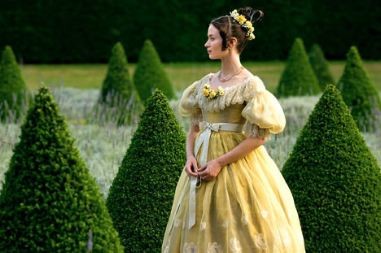The Young Victoria

The Young Victoria, a chronicle of Queen Victoria’s early days on the English throne, avoids all the historical-epic pitfalls. It’s a trim, robust film whose period-piece trappings—sumptuous production and costume design—never threaten to overwhelm the human interaction or muddy the dramatic arc.
That arc is the education of a young royal. In her first leading performance, Emily Blunt plays Victoria as brisk, witty and independent. She resists the at tempts of her German mother, the Duchess of Kent (Miranda Richardson), and her stepfather, Sir John Conroy (Mark Strong), to use her as a pawn. But her inexperience in statecraft surfaces when she allows herself to be manipulated by a more charming ally, Lord Mel bourne (Paul Bettany), whose counsel she relies on so much that it unfairly disadvantages his political adversary, the prime minister, Sir Robert Peel (Michael Maloney).
Julian Fellowes’s script is extremely canny about the ways in which a monarch’s private predilections invariably influence the affairs of state. When Melbourne persuades Victoria to enlist his wife as her lady-in-waiting, her favoritism has the bi zarre effect of unseating the government.
Fellowes and director Jean-Marc Vallée juxtapose Victoria’s struggle to find her own voice with that of Prince Albert (Rupert Friend), her German suitor. In its early stages, Albert’s courtship of Victoria is an act of patriotism: he represents his king (Thomas Kretschmann), who wishes a stronger British-German alliance, rather than his own heart. When he falls in love with Victoria he has to pull away from other influences and become his own man.
Much of the film is a love story between two spirited young people wise enough to trust their hearts. Albert wins Victoria’s after she confides in him, in the days before she ascends the throne, that she feels helpless against the politically astute adults around her—and he replies that her only recourse is to learn to play the game better than they can.
From the outset, the marriage is passionate but not easy; Victoria learns that it requires its own set of negotiations. Albert isn’t content to be a consort, and he’s intelligent and imaginative: he has contributions to make. He’s constantly battling ironclad traditions, some of which stopped making practical sense after the Middle Ages—and Albert is a practical man. The queen, advised by Melbourne against letting her husband take too large a role, makes the youthful error of being high-handed with Albert, treating him like a subject. Some of the best scenes focus on Victoria figuring out how to steer the vessel of her marriage—what it means to take on an equal partner—while also learning to steer the ship of state.
The movie is satisfying on all fronts: it’s literate, visually pleasing and impeccably acted. Blunt gives a vibrant and sensitive performance in a role that has, strangely enough, rarely been placed in the center of a dramatic work—there have been countless Queen Elizabeths but few Victorias. (The last may have been Julie Harris’s justly famous television portrayal half a century ago in Victoria Regina.) Blunt is forthright but brittle, like a Jane Austen heroine.
Rupert Friend is so effortlessly skillful that he’s in danger of being overlooked, and the supporting cast is supurb. The marvelous Jim Broadbent plays ornery King William, whose death brings Victoria to the throne. It’s a small role, but the filmmakers give Broadbent a memorably funny scene in which the Duchess of Kent’s efforts to insinuate herself and her husband into the palace make the old king nearly apoplectic. The chameleonic Bettany is fine as usual, and Miranda Richardson gives a comic performance with an undercurrent of pathos as the interfering mama.
One of Prince Albert’s sweetest and most understated qualities is his instinctual kindness to his mother-in-law. In one scene, the duchess admits to Albert that she knows she isn’t welcome in her daughter’s palace, and he responds with a tenderness that suggests an understanding of the complexities of human relations—which can only enrich his marriage and Victoria’s reign. The historical record confirms the movie’s point of view. Walking away from The Young Victoria, you feel pretty good about the possibilities of the married state.





